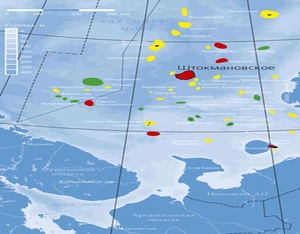
New Managing Director for Bellona Norway
The Board of the Bellona Foundation has appointed former Minister of Climate and the Environment Sveinung Rotevatn as Managing Director of Bellona No...
News

Publish date: February 24, 2011
Translated by: Charles Digges
News
A civil society expert group organized by the initiative of the World Wildlife Fund (WWF) and which included Bellona representatives, completed their work on the project documentation for the Shtokman field’s development.
The public environmental expertise was not completed by deadline because Shtokman Development AG, the company developing the project, did not furnish project documentation in a timely fashion. However, the WWF’s insistence was rewarded. The documents, though late and not complete, were given to the public commission of civil society organisations
The result of the two-month long analysis of the project material culminated in a 100 page document.
“Experts made more than 150 significant notations to the project. We hope that the conclusions will be reason for serious attention to these mistakes,” said Vadim Krasnopolsky, oil and gas project coordinator for WWF Russia.
During pubic discussion of the environmental impact assessment in 2010, we noted that Shtokman Development AG was not striving to introduce changes to the project, even as they accepted the suggestions. Now, having received the results of the civil commission, we counting on the company to change its approach and will work out the project specifically in the environmental impact assessment and submit it again for the state environmental expertise.”
“The environmental impact assessment materials submitted by Shtokman Development AG are extremely underdeveloped and don’t allow for an objective evaluation of the level of environmental impact of the project, and, consequently, don’t guarantee its environmental safety,” said Nina Lesikhina, energy projects coordinator for Bellona Murmansk. “Neglecting such issues at the level of engineering could lead to tragic consequences for nature in the Arctic region. In order to not let such things slip, Shtokman Development must review the results of the environmental assessment of sea installations taking into account the conclusions of the public environmental expertise and send it again for a state environmental expertise,” she said, adding that, “the Federal Service for Supervision of Natural Resources [Rosprirodnazdor], in its turn, must more carefully and professionally approach the issue of environmental expertises of large scale projects like Shtokman.”
The expert commission listed the most serious oversights of the project with regard to the environmental impact assessment as follows:
“It is necessary to acknowledge that this large-scale international project has a colossal amount of clear environmental loose ends,” said the WWF’s Krasnopolsky. “The stock holders in Shtokman Development AG must be aware of all their responsibility for implementing such hasty decisions. After all we are talking about the fragile ecosystem of the Arctic, which will take decades to restore.”

The Board of the Bellona Foundation has appointed former Minister of Climate and the Environment Sveinung Rotevatn as Managing Director of Bellona No...

Økokrim, Norway’s authority for investigating and prosecuting economic and environmental crime, has imposed a record fine on Equinor following a comp...

Our op-ed originally appeared in The Moscow Times. For more than three decades, Russia has been burdened with the remains of the Soviet ...

The United Nation’s COP30 global climate negotiations in Belém, Brazil ended this weekend with a watered-down resolution that failed to halt deforest...